#Recusant analogs
Text
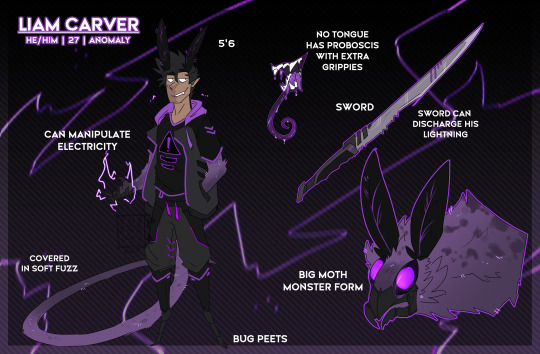

Liam Carver ref
Liam everyone! with a bonus lil full body of his monster form, HE IS MY FAV LIL MOTH BOI AND IM HAPPY TO FINALLY SHARE HIS REF AS HE HAS RETURNED TO HIS PURPLE SELF
Liam was originally based around vampire moths and moth man however no longer reflects that as he became more based on Wasps and All Moths.
Want early access to my content, Subscribe to my patreon!
#art#my art#my character#artists on tumblr#design#Liam Carver#Infamys End#Recusant Analogs#ref#character ref
65 notes
·
View notes
Text

Finally got back to this character. Her last ref was from 2020, and she really needed a redesign... so here she is! I'm quite happy with how it turned out :]
As it also says on the ref, Volites belong to my friend, @theashpit
#artists on tumblr#digital art#humanoid#shapeshifter#monster#character design#original character#oc#character reference sheet#ref#Sharkk#RECUSANT ANALOGS (friend's universe)#my art#personal art
55 notes
·
View notes
Text
one of the reasons i like fantasy as a genre [preamble deleted] is that there are a lot of narrative tropes and problems i really love that don't really work in our society (the one i'm thinking of is "the host extended guest friendship before finding out that the guest is an enemy," and the closest analogy i can think of is "offered legal representation before finding out that the case harmed you directly," in which case, to my meager understanding of the law, both sides would just ask you to recuse yourself) & you can only read the Nibelungenlied so many times
#yes this is also why i end up reading a lot of older fantasy.#the extent to which people don't take honor seriously in our society bleeds over into fantasy societies#so newer fantasy *also* doesn't tend to have people who live & die for their honor#trope corner
65 notes
·
View notes
Text
Judge Tanya Chutkan rejects Trump's demand that she recuse herself | CNN Politics
She is a presiding judge and she is not removing herself as Donald Trump requested and Trump was insisting on it for a few days after the request and their proceeding they are making an analogy to Camilla and Trump to our son and what we're saying is we're sick of there analogies he's our son he's not yours everybody knows it and why you keep saying is that you're putting him on trial or you're going to put them on trial or he is standing trial and all sorts of dumb things and it's ridiculous there's like 150 times that you've done this stupid analogy and people are tired of it and it's coming around one more time no they're going to keep on doing it they said and people are asking who's doing all this and putting these people there who look like others and their names and all of that weird stuff history of out to be these Max and they are in a lot of trouble because they're making people feel very uneasy about what they're doing they are they're extremely evil people and they're running around Washington DC with this supposedly ask to grind and they're yelling at people say that he's the evil one and these are Max they're supposed to be the ones with it together and running the world. And they're saying it in effigy and a saying you should be brought to trial and they want to use his skills and so forth to invent for them only and it's not the only group that's saying this stupid s*** and we found out too other groups are spilling the beans it's really heinous stuff we are preparing for war as the max are provoking it and they are causing conflict between people already and they're trying to threaten for stuff and things and places and their failing miserably and they're putting themselves out of the picture and they're causing things to not go well and we noticed that people can't stand the way they are and they can't stand what they're doing and we asked what they say about it they say they're constantly fighting each other and getting others to get killed and it's disgusting instead of that's your way and that's what his way is and that's the way it goes with them and so we can't live this way no one can or all this way so we're separated from you somewhat and you're finding out you're insane is true and you can't take advantage of us as easily and it's making you angry and it's your fault because we don't want to live like you I'll be trapped in the cycle of death where you say it's normal and you live off other people die and it's gross and it's not a logical approach. So is this argument going around it's supposed to be spelled by me or something and we don't care I mean we know about this every day every second of the day so they feel they're creeping up on us by blabbing about the subject that got them in trouble and we are going after them and it's adding to the animosity we have for them and they're not aware of the problem they're closing for themselves. There's a huge war going on right now and it is the morlock being fought and these people the Max and others are trying to find us and we've had enough of it we are going to have to go after you now again and increase our ferocity in our approach some things that are happening are right along the lines of what we're seeing right here
-we are tired of how you're treating our son and we're moving in here and with pressure and force foreigners are doing it too.
-we're sick and tired of you delineating terms and telling us how things have to be and it's not your world and you're the screw-ups who messed up in the first place and all the foreigners oppose you as well as morlock you're not God almighty and you don't take precedence like it used to because you let go of power in exchange for messing around with a few people more so you're messing around with one person and you're giving yourself up all the time you're committing suicide you should do it elsewhere but that's what it looks like
-right now the morlock they have been losing and they've been losing territory and people and they're losing territory to a few groups and we take a bunch of it we start getting a lot more aggressive the max were attacking and keeping it and we said we're going to keep our share if you're going to keep doing this stupid s*** and it is dumb and how they say it's dumb so we go around and we're collecting area and we're attacking warlock and some of the targets are theirs and ask us what we're doing and we said we're going after these criminals too we told you not to you of us you're another group sit back and shut the f****** and we're going to stop these people from blowing the planet up and you seem to be lousy at it and they got into some sort of argument they said with us I said what is your argument you get to threaten everyone and these other people don't and we can't stop you from destroying the planet. And they said we don't need to talk to him no they kept on arguing and they're still arguing and they're not talking to anyone cuz we're not listening we have spies watching but they're blabbing and blabbing and blabbing and they're insane as well and we are going to cut them to ribbons in some places where they refuse to listen and we're going to take them down their system is insane and it's been proven to be stupid and it's supposed to be all for one guy and it fail and he's miserable and he is going downhill and he's going to be without anyone because of his own system and the max actually admitted it that's why he's separated so he said that's your father who came up with this method that you're following and we realize you can't change but that's what it is so they're still going around chasing their tail and biting at each other and we are taking territory and that's how it's going to go it's almost like we don't have to say anything and they have the same reaction and we did check that and no they like to go through with us. We've taken a lot of territory since yesterday and we need to keep taking more and we don't want them with any they're assholes
-we do have a lot more to talk about and we'll talk about it in a moment
Olympus
0 notes
Text
Equal Protection Under Law?

Good day,
The message was initially transmitted via email to some persons not further identified.
In an effort to increase the likelihood of delivery of this note I have opted to transmit it in plain text. For that reason, the URL provided below will NOT link to the web page but must be copied into the address bar of a browser to direct to that page.
That page is not linked to any others on the hosted site or any other sites at all. The pleading begun and described on that page was finally written in late 2020 in ultimate protest of actions of the Government of the United States designed to avoid duty in lieu of personal political beliefs.
The MarGin Consulting web site is maintained for a self-owned business operated as a legal nurse consultancy by this author. The unlinked page containing the initial draft of a pleading declined by a score of attorneys as non-justiciable is on that page in its entirety: https://margin-consulting.com/ jyA6S6kSCS2K4GZ/
Chief Justice Roberts recently discussed the issue of a diminution of respect and regard for the integrity of The Court. The Court has suffered assaults on its integrity by seating three members demonstrably lacking in the integrity of persons of honor who have served this Nation for more than two centuries. In fact, their acceptance of their positions is analogous to finding a wallet on the floor of a hotel lobby and placing directly into their pocket without making any effort to identify its owner.
Camus made the point that those observing what they know to be a wrong and doing nothing have a greater degree of culpability than those actually committing the wrong act. The philosophical basis for that position is likely that those committing the wrong act may not be possessed of sufficient intellectual capacity to recognize the act as wrong while those observing know the act to be wrong and fail to defend the weak.
The politicization of The Court began upon the death of Justice Scalia. His proposed replacement was denied a hearing based solely upon political partisanship detached entirely from duty. Unless, of course, it is the opinion of The Court that duty may be executed at will and not upon need. Firefighters, law enforcement officers, soldiers, physicians, and so many more will be relieved to know that they are permitted to choose when to do their duty based upon nothing more than personal, whether political or no, preference without penalty.
Of note at this juncture is that the candidate named by the responsible appointing party at that time was later confirmed by the United States Senate with 70 of 100 votes in favor as Attorney General of the United States. This information supports the likelihood of the appointee's qualifications to have been seated upon The Court. Further, this demonstrates the substantial political influence on this Court and all Courts below.
Additionally, The Court would do well to identify any member of the Judiciary appointed after an announcement that appointments are based upon an agreement not to recuse where conflicts arise should those conflicts somehow benefit the appointing party. The integrity of The Judiciary is diminished by any member accepting an appointment without clarifying that impartiality, integrity, and honor require that there be not even an appearance of bias in its function. Sadly, this is no longer the case.
Respectfully submitted,
Martin A. Ginsburg, RN
The following is the information uploaded to the web page identified above:
DRAFT OF BRIEF OF AMICUS CURIAE MARTIN A. GINSBURG, RN THROUGH PLAINTIFF’S MOTION TO DENY AND QUASH APPELLANTS MOTION AND WITHDRQAW CERTIORARI TO THIS COURT IN THIS MATTER PERMITTING THE PEOPLE OF THE UNITED STATES THE OPEN GOVERNMENT FOR WHICH WE HAVE SO LONG DREAMED
1. This action arises under 16 Stat. 141 (1870) ; U.S. Const. amend 14; and 42 U.S.C. § 1983, 1985(3), 1986.
2. Jurisdiction inures to this court under 28 U.S.C. § 1331.
3. Venue is appropriate under 28 U.S.C. 1391(b).
4. This court has the authority to issue declaratory and injunctive relief pursuant to 28 U.S.C. §§ 2201 and 2202.
INTRODUCTION
5. This lawsuit seeks to [re]assert the sovereignty of citizens over their government in keeping with the traditions of the United States - sovereignty most familiarly described in the words of the [U]nanimous Declaration of the thirteen [U]nited States of America dated 4th July 1776, that "[w]e hold these truths to be self-evident, that all men are created equal . . . ." and ". . . . to secure these rights, [g]overnments are instituted among [m]en, deriving their just powers from the consent of the governed" and the remarks of President Lincoln at the Gettysburg, PA battle site given on 19th November, 1863, regarding government "of the people, by the people, for the people . . . "
6. The founders of the United States recognized that to provide security and stability for its citizens, a government requires certain capabilities to enable fulfillment of essential governmental responsibilities; authority to bargain with other nations on behalf of the people, legislative authority to provide a stable system of laws throughout the nascent nation, judicial authority to enforce a system of laws.
7. Additionally, the actions of each component or branch of this new government would be subject to review and adjustment by the other branches for the protection and stability of society as a whole.
8. Owing to the new nation's foundational ideology that government exists at the discretion of and in service to the citizenry rather than the then long held belief that citizens owe all to their government and have no right to expectation of reciprocity of loyalty unless such reciprocity specifically serves to protect and advance the cause of government the United States was, at its formation, unique in world history.
9. This fundamental belief directly resulted in a representative form of government not previously experienced.
10. Recognizing that more densely populated members of the union might seek to subjugate lesser populated regions for their benefit, the founders took steps to prevent simple majority rule.
11. Representation in the federal government is apportioned by population in United States House of Representatives but equally among the several states in the United States Senate.
12. This allows heavily populated states to express their wishes in the House while providing security for the lesser populated states through their equality of representation in the Senate.
13. Another significant solution to this dilemma is expressed in the separation of powers iterated in the Constitution of the United States.
14. This mutual oversight capability has, throughout the history of the United States, protected the people of the United States from the tyranny and subjugation of pure majority rule and governmental excess.
15. History is replete with examples of majorities oppressing minorities through governmental action or with governmental support and the founders of the United States took great pains to assure that such treatment would not befall the citizenry of this then new nation.
16. By way of example; recent history includes two events notable for their similarity: the widely known Holocaust in which as many as FOURTEEN MILLION (14,000,000) non-combatants were killed in German controlled territories alone, including a significant majority of the Jewish and Romani populations in these areas comprised actions sanctioned by a duly constituted government coalition forming a majority of the representatives of the people; and the genocide of the late 20th century in Rwanda during which as many as two-thirds of the indigenous minority Tutsi peoples were slaughtered by the majority Hutu.
17. Violent revolution has long been the only viable means by which an oppressive government is removed from a position of control.
18. It is the opinion and belief of Plaintiff that violence is not an ethically acceptable manner of redress, requiring instead that such offenses to the sensibilities of the citizenry be brought before the judicial branch of government to protect the rights of all citizens at all times from unconscionable limitation, restriction, erosion, or infringement by governmental action or inaction.
19. The constitutional form of government established in the United States offered the world its first best hope for elimination of the need for death to ever be the price of liberty.
20. Much is made of “Constitutional obligations” in the currently constituted United States Senate.
21. If this court should rule that such is a “Constitutional obligation” of the currently constituted United States Senate, that decision, must be taken with the position that a failure to perform “Constitutional obligations” in the last two Congresses assembled is a de facto violation of the equal protection of laws guaranteed by Const. amend 14.
22. Such ruling may have the effect of invalidating other actions undertaken by the two Congresses so described.
23. Affirmative arguments that such is precedent long established are disallowed under the Federal Rules of Civil Procedure as affirmative defenses not plead in the initial response and therefore waived.
24. The initial response to objections relating to the timely execution of the duties of the United States Senate were based solely upon Senate discretion and not political affiliation of members of the Senate or the Executive.
25. Such considerations in either case fly in the face of constitutional duty and the right to equal treatment under law and its application by the Government of the United States entire.
26. Duty is an act absolutely required to be performed at the time of occurrence of the act or circumstance calling for its initiation.
27. Florida's contention that Emergency Medical Technicians and Paramedics have a "duty to respond" does not permit the emergency services provider any latitude in determining when to execute this duty.
28. Similarly, members of the United States Armed Services have a duty to carry out lawful orders and there is no rationale or entitlement to fail to immediately execute such duty.
29. The Senate as currently constituted has one third of its seats on ballots around the nation and a failure to conduct Senate “Constitutional obligations” in a manner consistent with the most recent precedent, pled without assertion of affirmative rejoinder and claiming protections of such an affirmative defense of action, insults the tens of thousands of military personnel who became eligible to vote after the failure of the Senate as then constituted to fulfill what it now calls a “Constitutional obligation”.
30. Such unscrupulous behavior devalues the sacrifice of families nationwide by denying those Soldiers, Sailors, Airmen, Marines, and Coast Guardsmen, whether active, reserve, or serving in their State Militias, or National Guard, by denying the right afforded others upon a political whim.
31. To deny these persons an opportunity to participate in their democracy to the extent that others enjoyed only two years prior is to deny them equal protection of the government under law as guaranteed by Amendment XIV of the United States Constitution and those Constitutions of the “Several states” wherein is also enshrined the concept that all are equal before the law entire and the therefore entitled to equal representation and participation without regard to anything other than citizenship.
32. Scheduling any of these proceedings for 23OCT20 is especially disrespectful to the guardians of the United States Constitution by betraying those currently in the service of their nation on the anniversary of the brutal slaughter of TWO-HUNDRED TWENTY (220) United States Marines, EIGHTEEN (18) members of the United States Navy, and THREE (3) members of the United States Army in a terrorist bombing.
33. Plaintiffs respectfully request the Court take judicial notice of the text, in its entirety, of the United States Constitution wherein there is no mention of political parties or any consideration given to whether any such organization exists, much less have any rights greater than those of any individual citizen or entitlement to any course of action related thereto.
34. Precedent long established is not necessarily precedent that is consistent with equal protection under law or the interests of justice; most notably educational segregation, poll taxes, voting rights for women, voting rights for minority groups, or equal access to hospitals or other vital facilities.
35. Long established precedent given such weight would call upon the courts to never overturn flawed rulings of the past.
36. Such an argument begs the return of segregation (See generally Plessy v. Ferguson, 163 U.S. 537, 16 S. Ct. 1138, 41 L. Ed. 256 (1896), slavery (See generally Dred Scott v. Sandford, 60 U.S. 393, 15 L. Ed. 691, 15 L. Ed. 2d 691 (1857)., the vote in the hands solely of land-owning whites, and other such institutions of long-established precedent manifestly anathema to the underpinning justice of our democracy.
37. The history of the United States demonstrates that as societal mores and insights evolve, so do the laws of the nation, further clarified by the courts and codified by the legislatures lest we still be subject to a form of government that at its core presented as racially, ethnically, and religiously restricted in its ways of governing as was the British Government against which the founders rebelled:
The U.S. Constitution originally left it to states to determine who is qualified to vote in elections. For decades, state legislatures generally restricted voting to white males who owned property. Some states also employed religious tests to ensure that only Christian men could vote.
See: https://www.carnegie.org/topics/topic-articles/voting-rights/voting-rights-timeline/?gclid=EAIaIQobChMI0Ym-8v786wIVj8DICh0IGAjtEAAYASAAEgIHdvD_BwE Accessed 22/1052L SEP20
38. Precedent would also require the recusal of at least one member of the Judicial Committee of the United States Senate as an interested party, leaving the Committee lessened by nearly 5% and causing one State to lose 50% of its representation in a floor vote, diluting the representation of the people of that state.
39. Additionally, precedent would require recusal of not less than two members of the United States Supreme Court and scores of Appellate and Trial Court judges to prevent any appearance of bias and reclaim the Judiciary’s independence as envisioned by the Founding Fathers in the United States Constitution.
40. The inherent hazard of “winner takes the spoils” is that the argument will devolve into a fight; or worse, a revolution.
41. The Courts have been fully capable of correcting past wrongs as societal mores have shifted over time.
42. This Court, nay any Court, would be in error to endeavor to lead societal change and has, in the past, properly followed such changes enshrining them in the laws of the land to endure beyond the ages of men.
43. This Court has the constitutional authority and duty to protect the citizenry from abusive machinations of political whim from every front where such machinations seek to apply the rules of government unequally to the people and functions of government based upon race, creed, ethnicity, gender, or political preference.
44. Plaintiff asks the Court to take Judicial Notice of the Primary Elections of Broward County Florida in 2000 and published reports of the subversion of people’s access to ballots that were not protected by the political parties nor their acolytes in public office despite having sworn oaths to do those things in the execution of their respective offices.
45. Plaintiffs further ask the Court to take Judicial Notice of the abandoned filing in the District Court for the Eastern District of North Carolina 16-cv-105 and its discussion of disingenuous political machinations diluting the rights of the citizenry.
46. Justice Scalia, in his independent opinion in Borough of Duryea, Pa. v. Guarnieri, 564 U.S. 379, 131 S. Ct. 2488, 180 L. Ed. 2d 408 (2011), makes a cogent argument for restricting petitions to the executive and legislative branches of government.
47. In that dissenting opinion Justice Scalia wrote:
There is abundant historical evidence that "Petitions" were directed to the executive and legislative branches of government, not to the courts. In 1765, the Stamp Act Congress stated "[t]hat it is the right of the British subjects in these colonies to petition the King or either House of Parliament." Declaration of Rights and Grievances, Art. 13, reprinted in 1 B. Schwartz, The Bill of Rights: A Documentary History 195, 198 (1971); it made no mention of petitions directed to the courts.
48. Justice Scalia failed to discuss whether the executive and legislative branches acting in concert to usurp the rights of the citizenry in a manner inconsistent with the edicts of constitutional language and justifying such action through the claims of political precedential, rather than secular constitutional, arguments is so offensive to the sensibilities of those indebted to the foundational intentions of the parents of our nation would overcome the “historical evidence that "Petitions" were directed to the executive and legislative branches of government, not to the courts”. Id.
49. As in science where an absence of evidence is never construed as evidence of an absence; where courts address as narrowly as possible the issues at bar, not discussing any particular perspective does not constitute a ruling or precedent; quite the contrary, it speaks to a desire to not place the issue in front of the court for fear of an adverse outcome or ill-interpreted or mis-applied precedent.
50. Further, when an executive reports that an appointment to a Senate confirmed position, nay sir, top two such positions within the government would not have been made had the executive known the appointees would recuse for cause pollutes the process to such significant a degree that a pause must be taken to fully consider the implications.
51. It is Plaintiff's opinion and contention that the most recent two appointments to this court enjoyed a Senate hearing that failed to ascertain whether an executive who had personally reported a reluctance to appoint anyone within the Department of Justice if such executive were aware of an intent to recue in the face of a long recognized conflict of interest.
52. In the current environment, and in the absence of action to prevent its occurrence, it must be presumed it is acceptable to this court and congress to have appointees considered, confirmed, and seated in governmental offices who are prepared to hear cases where under other circumstance their recusal would have been immediately forthcoming and that a stated refusal to recuse under any circumstance is now the expected behaviour of the Justices to the United States Supreme Court.
53. Should these members of the court refuse to step aside to protect the Constitutional processes of governmental function and oversight from undue influence or bias confidence in this High Court will falter and see this Court's influence crumble onto the heap that is rapidly becoming our previously democratic government.
54. It is beyond the pale that this Court will engage in rule making to which this Court is not subject.
55. Such is the lot of every Congress in the history of this nation - to subject the citizenry to rules that are not applied equally to its members.
56. The foundation of any representative government is the trust of the citizenry in its own sovereignty.
57. Where allegiance to any individual is of greater significance than allegiance to the principles of the Constitution; where citizens cannot know whether even the Supreme Court of the United States has been infected with misplaced loyalty, much like that seen in the Congress where cults of ideology have all but eliminated the capacity of this nation to protect itself from itself, the trust of the citizenry quite understandably has deteriorated to levels that form the basis of a clear and present danger to the very existence of this nation.
58. The executive has tainted the process with its complaints that appointees have, for the sake of integrity, and support and defense of the Constitution, recused to avoid even the appearance of impropriety and the Congress has supported that view both tacitly and actively leading to a fundamental mistrust of the institutions necessary to the existence of democracy.
59. This Court stands at the intersection of history and the future of our nation as no other Court has despite voluminous work spanning more than TWO centuries.
60. Remembering that during a hearing in the United States Senate, the argument was proffered that it would take until the then President was out of office and no impeachment could rightly move forward.
61. Ergo; the Senate of the United States deems that there is no relationship beyond the current term in the event an executive is not re-elected.
62. This places this Appellant in the unique position of arguing over documents that his most loyal and ardent supporters cannot hold out as being the property of the Executive.
63. There will certainly be an argument made that due to the political nature of the events in question there is no viable cause of action owing to what will likely be regarded as non-justiciable workings of a co-equal branch of government; however, Plaintiffs assert that as in Nixon v. Herndon, 273 U.S. 536, 47 S. Ct. 446, 71 L. Ed. 759 (1927):
The objection that the subject matter of the suit is political is little more than a play upon words. Of course the petition concerns political action but it alleges and seeks to recover for private damage. That private damage may be caused by such political action and may be recovered for in a suit at law hardly has been doubted for over two hundred years, since Ashby v. White, 2 Ld. Raym. 938, 3 id. 320, and has been recognized by this Court. Wiley v. Sinkler, 179 U.S. 58, 64, 65. Giles v. Harris, 189 U.S. 475, 485. See also Judicial Code, § 24 (11), (12), (14). Act of March 3, 1911, c. 231; 36 Stat. 1087, 1092. If the defendants' conduct was a wrong to the plaintiff the same reasons that allow a recovery for denying the plaintiff a vote at a final election allow it for denying a vote at the primary election that may determine the final result.
64. Additionally, regarding justiciability, this Court in Baker v. Carr, 369 U.S. 186, 82 S. Ct. 691, 7 L. Ed. 2D 663 (1962) addressed this issue:
We hold that the claim pleaded here neither rests upon nor implicates the Guaranty Clause and that its justiciability is therefore not foreclosed by our decisions of cases involving that clause. The District Court misinterpreted Colegrove v. Green and other decisions of this Court on which it relied. Appellants' claim that they are being denied equal protection is justiciable, and if 210*210 "discrimination is sufficiently shown, the right to relief under the equal protection clause is not diminished by the fact that the discrimination relates to political rights." Snowden v. Hughes, 321 U. S. 1, 11.
1 note
·
View note
Text
The Meaning of Saïx’s Scar

A sigil is a symbol you create with the intention of changing your reality in accordance with your will. All sigils are encoded with a specific purpose, for example, to attract a romantic partner, to set strong boundaries, to be more financially prosperous – the possibilities are limitless. While sigils were used in the past to symbolize and conjure up spirits, these days, sigils are used in a personal way to symbolically represent and manifest our own desires.

The Recusant’s Sigil is based on Greek letter chi. In Kingdom Hearts lore, the meaning is “death” and “endings”. But it’s not just a letter. It’s a magic symbol.
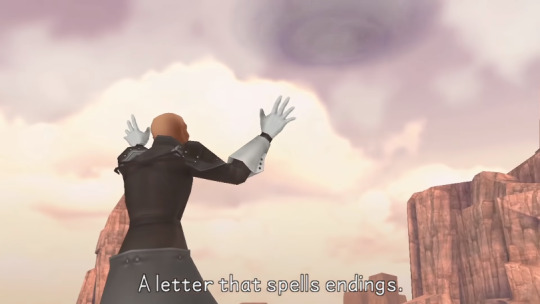
The Recusant’s Sigil (異端の印 Itan no shirushi, lit. “Mark of heresy”) is a symbol designed by Xehanort to represent the rejection of a Nobody from his original persona. It is incorporated into the new names of each of the original members of Organization XIII, and is derived from Xehanort’s sleeping memories of the χ-blade.
It was placed in each member’s name to represent the rejection of their original self. Since each member was to become a vessel for Xehanort’s heart and mind, the original persona needed to die.

Sigils are essentially like little seeds that are planted within the unconscious mind. Many things enter the depths of our minds, but not all of them are placed there intentionally or take root. The symbolic nature of the sigil also helps bypass the rational (skeptical) mind and enter the unconscious where possibilities are endless.

This might be why a simple symbol on Sora’s clothing had such a powerful effect on him. The “X” was on the clothing of Terra, Aqua, and Ven and also Riku in KH1.
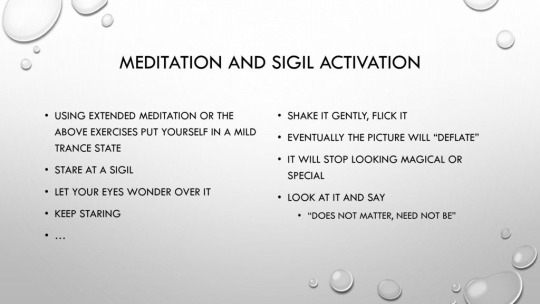
What gives sigils their power is the energy and intention behind them – and that is what helps them to sprout and blossom into manifestation. They are activated by meditation.

This is probably why Sora’s Nobody (who, according to Nomura, was born with Ventus’s heart) was made to stare at the Recusant’s Sigil when he was given his new identity as “Roxas,” an anagram of “Sora” with an “X”. It was to subconsciously program him to stay unaware.
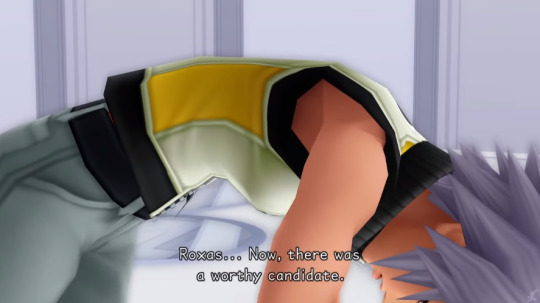
Roxas was a very worthy candidate for the New Organization XIII.
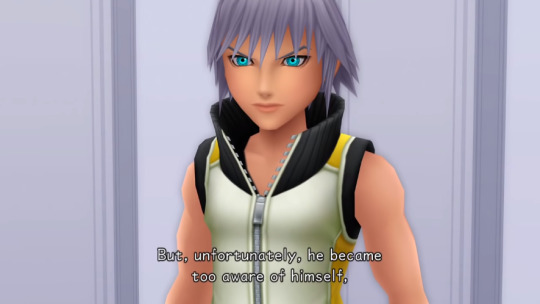
He was a good candidate due to his lack of self-awareness. But eventually he became too aware of himself and could no longer be used.

Buzz was afraid of losing his self-awareness and attacking his friends. And that’s exactly what happened.

At the Kid Corral, where Buzz was taken when he was possessed, Xehanort revealed that empty puppets can be given strong hearts. Apparently, the Toy Box was the world where he first learned to create vessels.

Secret Report 4: Experiments of the Heart – Notes on Subject X, Excerpt 2
Subject's memories have not returned, and our conversations remain less than lucid. My pilot studies used a handful of subjects, but none possessed the fortitude to endure them. Ultimately, all suffered mental collapse. I knew it would be a heavy blow to lose a subject as unique as she. Upon discovering the tests I've been conducting, my master demanded that I cease my work immediately and destroy what research I have compiled. Worse still, he ordered the release of my remaining subjects. She is gone. Where is Subject X now?
This is also the world where the report on Subject X is located, and it’s also at the Kid Corral. Subject X had no memories and was not lucid. It took a week for them to speak their first words, like Roxas. That means they lacked self-awareness, like Roxas did at fist. This would make them a very worthy candidate for a vessel, like Roxas.

Empty husks? Is he saying they’re going to break them with sorrow and put another heart into them…? Or did they already do it?
“Translation—they were gonna turn all the members into Xehanort.”
“X” represents the clash of pure light vs. pure darkness. A vessel needs to be suitable to contain Xehanort’s heart of pure of darkness, so only the strongest hearts will suffice.
The letter χ can be pronounced both "key" and "kye" (leading to some confusion) and symbolizes the perfect crossing of light and darkness. The χ-blade can be forged via a high-dimensional clash between those two poles. It is believed that the Recusant's Sigil also derives from χ.
Such a heart is rare and valuable. Even most of the original organization was unworthy. A vessel would need to be broken by sorrow, but its heart could not totally collapse. It’s only natural that Xehanort would want to use such a unique subject as his vessel.
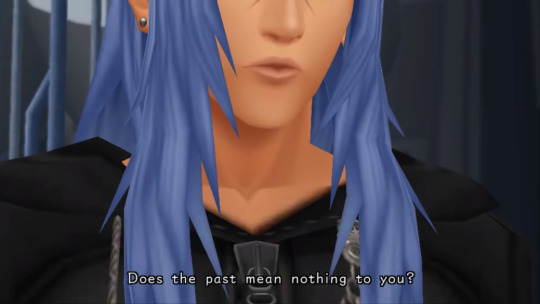
“As your flesh bears the sigil, so your name shall be known as that of a recusant.”
And the name “X” fits this concept perfectly. The experiments involved the darkness of the heart. All the subjects’ hearts collapsed. Subject X was the only exception.
I could not even recall my name. I was simply called "X" there.
Isa probably was given his scar at the same time he was given his new name, which happened to him as a human. He was no longer Isa, or even Saïx, but “X”.

“I’ll put the sigil of the recusant into your name once more,” Xemnas said.
Sigil of the recusant…? What’s that?
In the Japanese version, Xemnas actually doesn’t say anything to Sora about his flesh bearing the sigil. He says he’ll put the sigil into his name once more. And that actually makes a lot more sense. I don’t know why he said it to Sora in the English version. Maybe it was an error and that was actually a line meant for BBSV2 and Isa? I’m not sure. But it does fit Isa a lot more than Sora.
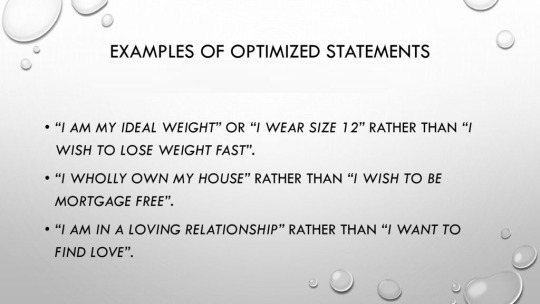
Sigils are activated by focusing on the desired outcome. But it’s important to use strong phrasing. Instead of saying “I want”, you say “I am". This ingrains it into your subconscious more readily.
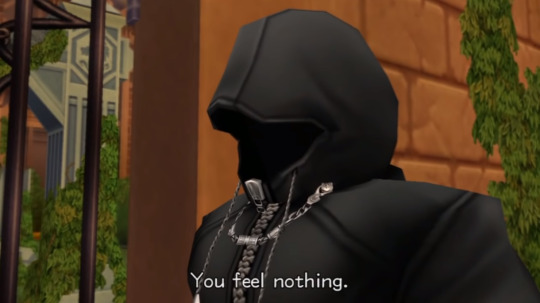
Xemnas spoke like that to Roxas while he was in his trance-like state. He told him he felt nothing...
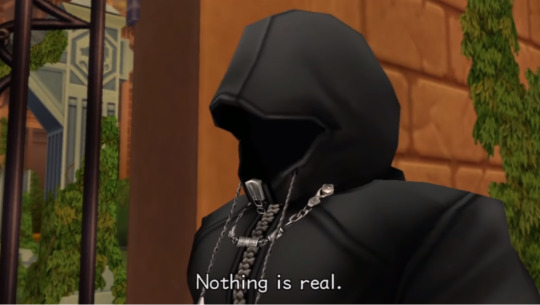
...and that nothing was real. He left no ambiguity about it. It’s a form of programming he likely did to all the Nobodies he recruited, which is why they had such a strong belief that they felt nothing, despite evidence to the contrary.

Xemnas didn’t say that he wanted Roxas to be a new person.

He told him that he was a new person. He was no longer Sora or Ventus---he was Roxas. Roxas held many of Sora’s memories inside of him, as did Xion. When they combined, they would create a complete Sora Replica.

Besides meditation, there are other, darker, methods of sigil activation, like in the use of black magic. Sexual climax is mentioned in reference to ritual sex magic. Sex magic is most potent at the time of orgasm, since that its when the energies of the two (or more) parties resonate the most strongly. But that isn’t really something a series like Kingdom Hearts focuses on, obviously. Another type of method involves pain.
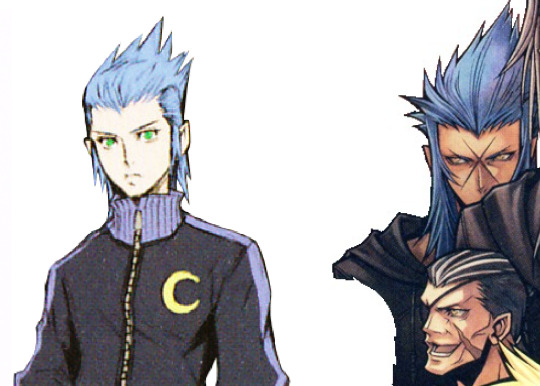
If Roxas’s sigil was activated by meditation, I think Isa’s sigil was activated by pain. And receiving such a scar would be obviously be physically painful. It definitely was carved deeply into his face. These dark undertones are what made Saïx/Isa such an interesting character to me.

The scar is located directly over his “mind’s eye.”
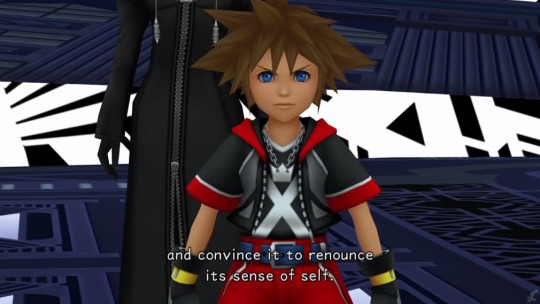
It’s a good place to put the sigil when you are trying to get the subject to lose self-awareness---to renounce its sense of self. In a way, receiving the scar may have been a way of programming him to stay mindless and empty. And it’s why he cannot see Xion.

Xemnas’s goal was to conquer the human heart and claim it as his own. And I think this is what he did to Subject X, which is why Isa was the first non-apprentice organization member, and one of the first vessels, along with Braig. Braig was special because he wanted to be a vessel. Isa was just Xehanort’s lab rat.

When Xemnas was telling Sora about the mind control experiments, he said he learned of the heart’s folly.
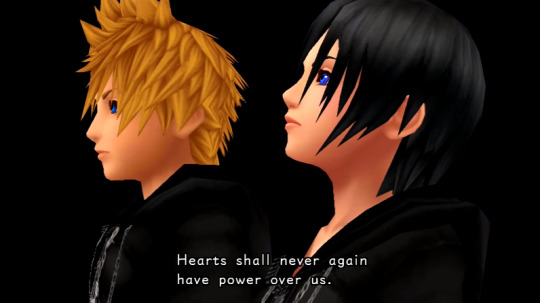
Which is similar to what he said on Day 95 during his speech.

“That which we treasure has power over us, Roxas. His heart is captive to it. And that makes it his weakness.”
Day 95 takes place at the Beast’s Castle. Every time Roxas goes there, it’s to figure out the Beast’s motivation for fighting. Roxas simply wants to understand the heart, but Xaldin wants to figure out the Beast’s weakness. And after Roxas goes there, he always talks to Axel afterwards. The heart has power over you when you hold something dear.

I think the reason the Beast was chosen to parallel Axel was because of Lea and Isa’s past. The Beast is cursed, he is a character that has anger and rage which is analogous to Saïx’s berserk state, and the key to breaking the spell over him is love.

Xaldin thought the rose was the Beast’s weakness. But it wasn’t. It was wanting to protect the people in the castle, especially Belle.
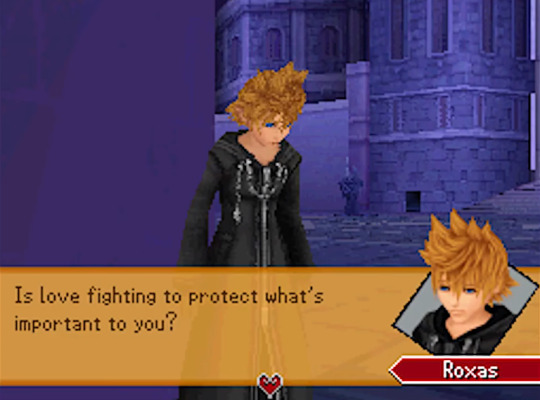
I think Nomura is a smart guy and knew exactly what he was writing.
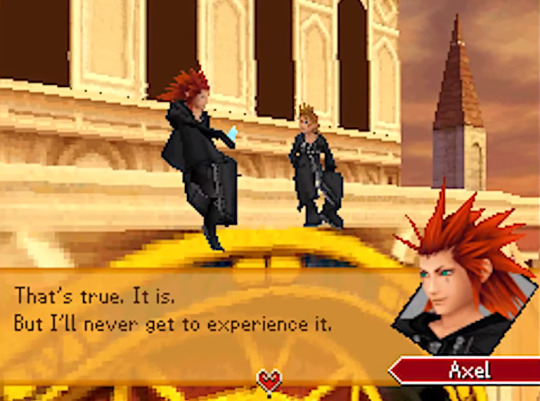
I don’t think it ever would have been made explicit or unambiguously canon in a series like Kingdom Hearts. But I do think that in the writer’s room at least, the understanding was that Isa and Lea had romantic feelings for each other. This was hinted at in a subtle manner. Isa’s love for Lea and his desire to protect him was his weakness, which got him turned into a vessel. This was supposed to be the surprising twist that would make Isa worthy to be in the epilogue. Not the fact that he was looking for a random girl or that he got Roxas a vessel. He deserved to be redeemed by his own merits.

In 358/2 Days, the Beast wanted to protect the people he cared about. He desired love more than anything.

This was used as his weakness to get him to fall to darkness. Xaldin told him that he’d never find love and this made him angry and full of rage.

He became full of darkness and lost control of himself, like Buzz did and he attacked his friends without realizing it.

Husks that had been made to throw away their hearts—in other words, they were going to plant another heart into those who couldn’t bear the pain…? Or, did they actually do that?
“They were going to turn all the Organization members into Xehanort.”
Lea was Isa’s weakness.
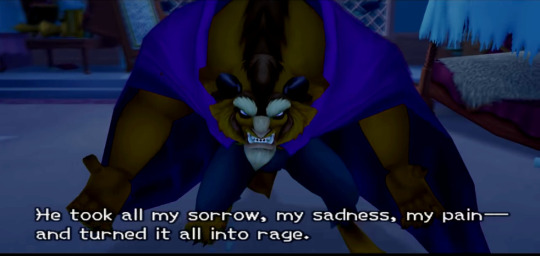
He was the key to causing Isa the most sorrow, sadness, and pain, which could then be turned into mindless rage. The Beast’s pain was feeling like a monster unworthy of love. For Isa, I think it was loneliness and the pain of losing Lea.
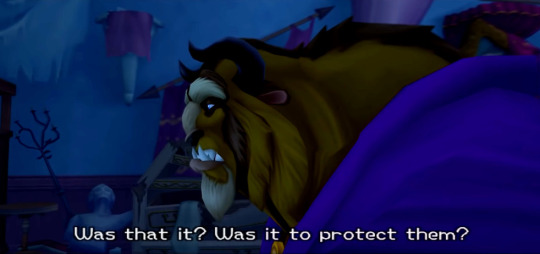
Although the Beast was under Xaldin’s dark influence, he was also acting on his own subconscious feelings. He was in a trance when he went on a rampage. But deep down, all he wanted was to protect his servants, which is why locked them in the dungeon.

I think Lea got his tear marks as a Nobody. When the manga zoomed in on them, Axel was thinking about harming Kairi. Without a heart, he never had to worry about feeling inner conflict or doubt about what he needed to do to achieve his goals. That’s why I think his tears represent his willingness to give up his heart, so he could get his best friend back. They also represent his pain over everything he lost as a Nobody. His life, his heart, his freedom, and his best friend.

Since Isa still had his scar when he was recompleted, he must have gotten it as a human. The manga also does a close-up of Saïx’s scar, giving a hint to its true meaning. It happened right after the scene of Axel’s tear mark, actually.

Saïx was hunting Axel down and then became extremely enraged, saying that Axel’s desire for friendship was based on an illusion created by his memories.

I think Saïx was subjected to the same little speech Roxas was after becoming a Nobody. He thought he never felt anything.

But like with Axel, he also became enraged at Roxas.

He says something very similar to what he told Axel, too. Isa’s purpose as a human was protecting Lea. Saïx remembers this. If Isa received his scar while Xehanort was trying to inflict the most pain possible on him, it makes sense that Lea was involved. What would hurt Isa the most is losing the thing he treasures most---which is Lea. I think it's why Saïx felt such resentment towards Axel when he made new friends, and ESPECIALLY when he left the organization. It was Isa's love for Lea that caused him to lose everything. It's understandable that he'd hate Axel if he thought he turned his back on him after all that. He was extremely hurt, even if the feelings were technically not his own.
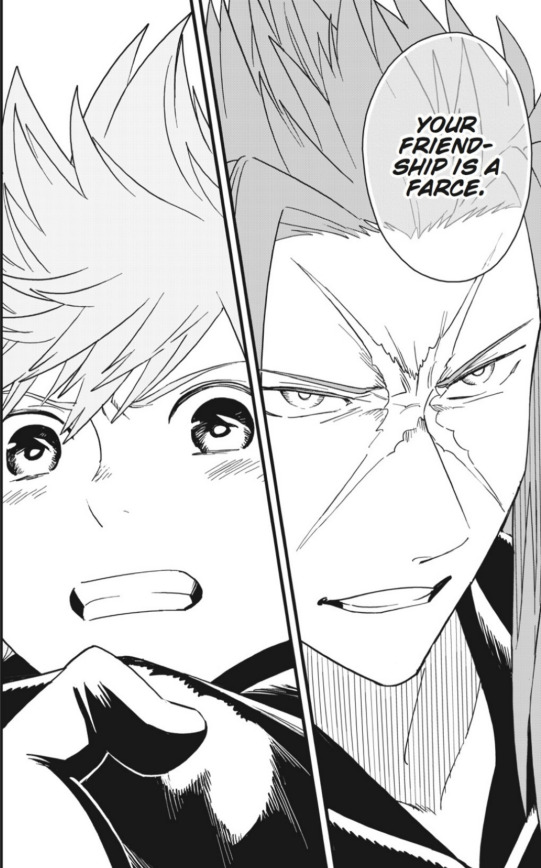
His scar is really prominent in these scenes, too.
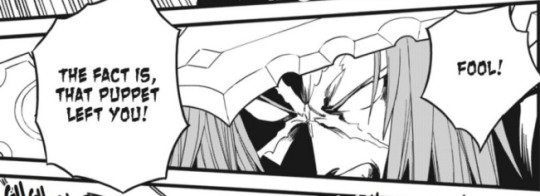
Basically, I think that the X-shaped scar represents Isa's physical and emotional pain as Subject X, which was used to break him, capture his heart, and turn him into a vessel during the experiments on the darkness of the heart. They created darkness in Isa using his love for Lea against him. The "X" also represents the "death" of Isa.
45 notes
·
View notes
Text
a.s.h.es, ashes (we all fall down) chapter one
Jesus take the wheelie HERE WE ARE
(huge thanks to @broadwaytheanimatedseries for helping me with some of the finer/ kinda fucking important details for this fic! and shoutout to @fuzzylittleb for editing this for me!)
Fandom: Thomas Sanders/Sanders Sides
Pairings: Eventual Logicality, Eventual Prinixety, RED (Remy/Deceit/Emile)(it’s pre-established but it’s in the back seat for a bit), So much platonic Analogical and Royalty oh my god-
Summary: After a recuse gone wrong, SuperHeroes Logan and Virgil find themselves with mysteries on their hands- but most importantly, who in their organization A.S.H. wants Logan dead.
Word Count:4,506
Trigger Warnings: Fire, Injuries, Unconsciousness, Panic Attack, Violence, Cursing
Next>>
Chapter One: Smoke in Your Lungs
Pushing open the glass doors, Logan Cosmos scanned the busy café. He adjusted the bag over his shoulder as he walked towards a booth in the far left corner. When he sat, he snapped his fingers in front of the boy seated across from him. The startled boy jumped, pulling off his headphones and glaring at Logan.
"Hey! You didn't have to do that."
Logan cocked an eyebrow. "Really? You were wearing your noise-canceling headphones, Virgil."
Virgil Tempest shrugged. "They aren't exactly noise-canceling. I mean, for anyone else, I'd bet they would be but for me-"
"Your abilities get in the way?" Logan finished in a hushed tone.
"Yeah. One of the many woes of being a Super. Anyway, how was your class?"
Logan groaned. "To put it simply, my professor is a dumbass."
Virgil winced. "Ooof."
Then Logan sighed, leaning against the table. "Well, a positive. We do not have a mission tonight."
"Thank god."
"Negative: We still have a patrol."
Virgil groaned. "You win some. You lose some. I'm going to need caffeine for this, I'll go order."
Logan glanced at the cash register, where a green-eyed boy was handing an older woman a muffin. "Ah, he's working today."
"Yeah. He's annoying, but I'm more comfortable around him. It makes ordering less stressful when I crack a bad movie joke and he fires one right back." Virgil replied, standing from the booth.
Logan nodded, watching as his best friend walked away. He was so proud of Virgil, he didn't know how to put it into words. Watching Virgil battle his anxiety- watching Virgil win the battles with his anxiety- made Logan smile. As much as being a Super was difficult and tiresome and vexing, at least joining A.S.H. had given Logan his best friend. Through long nights and battle scars and mental breakdowns, Logan and Virgil managed to keep each other in one piece.
As Virgil ordered a dubious amount of caffeine and battled the cashier over some hidden plot in a children's movie, Logan pulled out the tablet A.S.H. provided its Supers, digging it out from under his textbooks and notebooks. A flick of Logan's wrist turned the device on. Another flick opened up a map of their city. Sure, Logan could have done it manually, but sometimes the ease of using his abilities made the irritation of having them dissipate a bit. Logan drew his fingers over the screen, mapping out the area the duo would have to patrol that night.
A few minutes later, Virgil sat down, pushing a large drink across the table to Logan. Virgil barely touched the thing, yet it nearly fell off the table. The grey-eyed boy glared at the cup, and muttered a phrase that was probably "Fuck super strength."
Logan let out a hum and took a sip of his drink, which was the same London fog latte he always ordered on patrol days. Virgil chugged his espresso, then looked down at the map. "Where do we gotta patrol?"
"Few blocks in Southside. It's a residential area, mostly apartment complexes and a convenience store." Logan replied, zooming in on the map.
"Crime rate?"
"Pretty low. A mugging a few weeks back, and other crimes of that sort."
Virgil let out a sigh of relief. "Easy night. Thank god. I have a gig tomorrow afternoon, and honestly, I don't know if I could go through with it if we had a rough night."
Logan arched an eyebrow. "Another wedding?"
"Another fucking wedding. I hate weddings, Lo! Overpriced and tons of strangers."
"Well, usually wedding guests don't hold much conversation with the photographer. Also, some of the expenses of a wedding go to the photographer. Besides, you only need to continue doing these gigs until we retire from A.S.H."
Virgil ran a hand through his messy dark hair; Logan could see the blonde roots Virgil hated so much starting to peek through. "Speaking of A.S.H…." Virgil lowered his voice. "Have you found anything?"
Logan leaned across the table a little more, suddenly aware of how busy the café was. Too many people meant too many ears, and too many ears were too big of a risk. "Some files of old SuperHeroes who died in combat or retired, various recordings of meetings, and a few marked-up articles, all written by the same guy. Why are you so invested into looking into A.S.H.'s files, anyway?"
Virgil shifted in his seat, his eyes flitting around the room. "Just a hunch, okay? I feel like something's up."
The first time Virgil had brought up looking into the organization's files, it had been late at night during a patrol. Logan had tried to convince Virgil there was nothing that A.S.H. would be hiding, but the other Super was invested in the idea. To calm Virgil, Logan had started using his abilities to hack into A.S.H.'s database. At first, it had been simply to placate Virgil, but Logan had been digging for over a month and had only come up with a minuscule amount of information. There was more information, all of it heavily locked, and now Logan's own curiosity and pride were invested in decoding all the files.
Logan glanced down at the clock on the tablet. "We should make our way to Headquarters. Our patrol starts in less than an hour."
Virgil huffed, taking another sip of his drink and shifting in his hoodie. "Can we walk? I really don't feel like taking the bus."
Sliding out of the booth, Logan nodded. "Some fresh air would be nice. Do we need to stop at your apartment for your medicine?"
"I have backups with my suit, I'll take them when we get there if I need to."
Leaving the cafe, they walked through the streets of Azotha to the A.S.H. Headquarters, only stopping once for Virgil to capture a shot of the sunset's light reflecting off a skyscraper.
For the second time that day, Logan opened a pair of glass doors, holding them open for Virgil. The lobby of A.S.H.'s headquarters was mostly empty. The only people in the room were the receptionist who was playing a game on his phone and a pair sitting on the bench. Logan recognized them: a set of first-year partners he and Virgil had helped train. Eliza was a flyer and her partner Kris was the human equivalent of a magnet. Eliza was holding an ice pack on Kris's forehead, angrily scolding them. After quickly checking in quickly with the bored receptionist, Logan and Virgil made their way over to the younger SuperHeroes.
"Is everything all right?" Logan asked.
Kris looked up, their eyes gleaming despite their injury. "You'll never guess what happened! I ran into Knight and Nova!"
A panicked looked passed from Virgil to Logan. Knight and Nova were labeled the most dangerous SuperVillains of their time. The duo had been active for five years, and not a single Super had been able to catch them. A.S.H. sent missions to search for the SuperVillains constantly (Logan and Virgil had been assigned to that particular mission a few times) and yielded no results.
The strangest part was, Knight and Nova didn't associate with other SuperVillains, nor did they cause large scale destructions. They were a mystery, striking every few months, stealing from a major corruption or leaving cryptic warnings in the mayor's office, then disappearing again. They were an enigma, an enigma Logan wanted to solve.
Virgil did a quick scan of Kris. "Did they hurt you?"
Eliza sighed, "Not exactly. Kris, tell them how you got hurt."
The younger Super pouted, an embarrassed flush covering their cheeks. "Well, we found them on top of the Whynter Building, right? We didn't know what they were doing but they were unprepared so we attacked them!"
"I didn't attack them, that was Kris on their own!" Eliza complained. She pointed at her partner. "They thought we could capture the SuperVillains by ourselves."
"I surprised them, and the SuperVillains flew down into the alley. Knight used his abilities and I got confused. I thought I was chasing after Nova, but in reality, I crashed into a wall."
A beat of silence, then Virgil let out a laugh. "You crashed into a wall?"
"They crashed into a fucking wall." Eliza huffed. "Fell for one of Knight's illusions."
"To be fair," Kris said, moving Eliza's hand and fixing the ice pack on their forehead. "Other people, older and higher ranked people, have fallen for Knight's illusions too. They're so lifelike it's hard not too."
Logan bit his lip. "But neither of them injured you directly?"
"Nope!"
Eliza twisted a lock of her curly hair around her finger. "Knight actually looked apologetic, watching this loser slam into the wall."
Logan glanced at Virgil, who had his nose scrunched up in concentration. Most SuperVillains would have taken the opportunity to take out a first-year SuperHero before they could truly harness their powers. But not only did Nova and Knight let Eliza and Kris go, but they didn't try to hurt them either?
That was something to think about later. Virgil and Logan had to get suited up for their patrol.
"Take care of Kris, Eliza. Vee and I have a patrol to go on." Logan announced.
Eliza mock-saluted as the older SuperHeroes walked away. Logan glanced at Virgil, "Elevator?"
"Yeah."
Luckily no one else was riding the elevator, so they got the tiny shaft to themselves. Logan pressed the button for the fourth floor, and the doors slowly shut behind them. Music Logan swore was older than the building poured out of an old speaker. Virgil glared at the speaker as if he was trying to make it explode. Luckily for the janitors, Virgil lacked that ability, and the doors opened before Virgil could decide to smash it.
The fourth floor was a little bit more active than the lobby, with a few Supers suiting up for patrols and missions, and a few more packing their bags and heading home. Logan led Virgil to their lockers, placing his palm against his, while Virgil did the same next to him.
The touchscreen connected to his locker opened, and Logan grabbed the black material hanging in it. If Logan ever took over A.S.H., the first thing he would do was change the uniforms. First of all, the material was irritating, which made fighting uncomfortable. Logan swore he had more welts from the fabric of his uniform than from actual combat. The suit was built for protection though, not comfort. That aside, each uniform was identical, making it difficult to tell the difference between Supers. Each SuperHero had their unique logo stitched right above their hearts, but could you see that during a battle? No. Not at all.
As Logan pulled the suit over his clothes, his fingers brushed over his logo. Virgil had designed it for him. It was the letter G, and Virgil had designed it to look like the letter was glitching, to associate with Logan's codename. Virgil's own logo was a spiking heart rate, stitched into his suit with careless caution.
"Lo? Can you untangle my earpiece?" Virgil asked, struggling to pull up his suit. Logan sighed and grabbed the communication device hanging from Virgil's locker. Logan had not an inkling of a clue how, but Virgil had managed to get the earpiece twisted with his eyepiece.
"Virgil? How- how did you mess this up so horribly?"
Virgil sighed, zipping up his uniform. "I just threw it in there on Monday, I don't know how it got so tangled!"
Logan groaned, finally pulling the pieces apart and tossing them at Virgil. His friend caught them with ease (damn his powers). Logan pulled on his own, untangled eye and earpieces, snapping his eyepiece on his glasses. Then, he snapped his finger to activate both pieces. Virgil rolled his eyes, manually turning on his equipment. "We online?"
"We are indeed."
Virgil gave Logan a wicked smile, his teeth flashing in the electric light. "I'll beat you downstairs."
Then, Logan blinked, and Virgil was a blur in the corner of his vision. A swear escaped Logan's lips and he closed his eyes, picturing the outside of the headquarters. He felt the familiar fizzling in his gut, and when Logan opened his eyes, he was standing outside with the night breeze blowing in his hair. Seconds later, the glass doors next to him were thrown open, and Virgil skidded to a stop next to him. "Damn the people on the stairs."
"We're making excuses now, Vee?"
"Damn you too." Virgil flashed Logan a set of double-birds.
"If you kept doing that, I'm not going to let you teleport with me to our patrol location."
Instantly, Virgil had his arms thrown around Logan's shoulders. "No, no hey, you're my best friend Lo! I love you!" He announced, dragging out the 'o' in love.
Logan rolled his eyes, a fond smile forming on his lips. "You only love me when you need something from me."
"If that was true, would I have shown up at your house with mint-chocolate chip ice cream when NASA released the black hole image and you freaked out for three hours?"
Instead of responding, Logan pictured the convenience store he'd seen on the digital map earlier. Virgil yelped and dug his nails into Logan's shoulder as the two of them teleported.
"Hey!" Virgil snapped. "That wasn't cool!"
"My apologies."
"Hmph. For that, I'm taking the eastern side of this sector."
"Why?"
Another wicked grin passed over Virgil's features. There are fewer buildings on the Eastern side. Less work for me. Stay out of trouble, Glitch."
Logan rolled his eyes. "Same to you, Adrenaline."
Virgil gave his partner a mock salute, before speeding off into the distance. Logan watched him go, then pressed his fingers against his eyepiece. A map of the western side of the sector glowed to life in his vision. Logan zoomed in on an apartment complex, memorizing its features, then teleporting there.
The patrol was uneventful. For the past three and a half hours, Logan teleported from rooftop to rooftop, searching for any suspicious activity. With only thirty minutes left on patrol, Logan was sitting on the rooftop of a building, mentally going over the notes his physics professor had given that day.
Then, he smelt the smoke.
Instantly Logan was on his feet, eyes searching the horizon as a scream echoed from a nearby building. Smoke was pouring out of an apartment window, and flashes of red and yellow were visible through the smoke. Logan concentrated on his comm, turning it on. "V- Adrenaline?"
"Issue on your end?" His best friends voice crackled through the comm.
"Fire. Anderson Street, third building on the left. Requesting back up."
"On my way, Glitch."
Logan shut off his comm, glancing at the ground below him and teleporting down. He spirited down the street, stopping in front of the building. The flames were starting to grow, and people were running out of the complex in a panic.
Logan didn't have the time to explain he was with A.S.H., which was against protocol, but if he did, he would have lost valuable time. Logan entered the building, gagging on the smoke in the air. The first floor was clear but on the second floor, Logan found a younger girl trapped behind a cabinet. Teleporting behind it, Logan knelt next to the girl. Her dark eyes were wide, and she was shaking.
"I'm going to assist you, may I lift you up?" The younger girl stared at him for a brief moment, then gave him a brief nod. Logan scooped the child into his arms, and she gripped his arm tightly. "Close your eyes now, all right?"
The girl obeyed, and Logan teleported them outside. The girl opened her eyes, staring at him with wonder. "You have magic?" She whispered in awe.
"No, it's a gene-. Nevermind. I do indeed have magic."
The girl's eyes widened with glee, but before she could reply, a man ran up to them. "Alina, darling!"
The girl looked at the man and smiled brightly. "Daddy! The magic man saved me!"
The man gave Logan a small smile. "Yes, he did. Now the magic man has to go save other people, okay?"
The girl nodded, and Logan handed her off to her father. The man muttered a quick, "Thank you," into Logan's ear before he walked away with his daughter.
Logan teleported back into the building when his comm was activated again. "G, there are a few more people on the fourth floor; there was someone on the third but I got them out. " Virgil announced.
"On it." Logan dashed through the building, making his way up the stairs until he reached the fourth floor, which was where the fire started. The heat was biting and ash started to stick to his clothes. Logan hesitated, looked around for which room held the most flames.
That was his mistake.
A cracking sound filled his ears, and before Logan could turn around to see what it was, something hit him in the back. Logan fell to the ground, his body held down by something heavy. He squirmed, trying to get free from whatever was holding him down, but he couldn't. He tried to teleport, but his mind was too frazzled from the hit and the heat to form the image Logan needed to teleport. Using the last of his concentration, Logan activated his comm, connecting with the A.S.H. Headquarters.
"This is Agent Glitch." He wheezed out. "I'm requesting back-up. There's a fire... I'm trapped in the building and my partner cannot get everyone out on his own."
Radio silence. Then a faint, "Cut him. He was getting too close to the truth." Static filled his ears, and Logan tried to reconnect to the comm, but the other end had severed the link. Understanding filled Logan's muddled brain. A.S.H. was leaving him to die.
Logan struggled against the weight on his back, but he was getting sluggish. The flames were closing in, the heat starting to overwhelm him. A hoarse scream roared from Logan's throat, but he doubted he could be heard over the roaring fire.
This was it. Logan was going to die.
He laid his head against the burning ground, gasping for air. He was going to die. He was going to die. Who would grieve him? His poor mother, who'd been abandoned by everyone else in her life? Virgil, who had just started getting to a place in life where his anxiety was livable? His friends from college? The other superheroes from A.S.H.?
The flames were closing in. Logan closed his eyes, accepting his fate. Before the flames could reach him, he heard a crackle of energy, and a soft, "Don't worry, I got you."
Then, the heat become too much, and Logan passed out.
-. --- - .... .. -. --. ... .- ... .. - ... . . -- ... -. --- - .... .. -. --. ... .- ... .. - ... . . -- ... -. --- - .... .. -. --. ... .- ... .. - ... . . -- ...
Beautiful blue eyes, the color of the sky at its absolute clearest, glowed slightly behind gray-tinted goggles, filled with something that looked like concern. Then, surprise bloomed, and Logan's eyes closed again.
-. --- - .... .. -. --. ... .- ... .. - ... . . -- ... -. --- - .... .. -. --. ... .- ... .. - ... . . -- ... -. --- - .... .. -. --. ... .- ... .. - ... . . -- ...
"Logan? Oh my god, oh my god please wake up, I can feel your heartbeat but you need to wake up, come on Lo." The voice was shaking, holding back tears. Logan opened his eyes, looking up at Virgil's gray eyes. His dark makeup was smeared and tears were streaming down his face. "Oh my god, you're okay."
"What happened?" Logan choked out, his lungs feeling heavy and his head fuzzy. He remembered the fire, his comm getting cut off (oh, oh hell, they had left him to die) and the beautiful eyes.
"I do- don't know." Virgil was talking fast, his chest rising and falling even faster. Suddenly, Logan was so much more worried for his friend then he was for himself. He grabbed Virgil's arms, attempting to ground his best friend.
"Name five things you can see," He instructed, voice still hoarse.
"You, my hands, the wall, I think that's a rat, and dirt."
"Good, four things you can hear?"
Virgil closed his eyes, a shaking breath coming out of his mouth. "My heartbeat, your voice, cars, that rat moving."
"You're doing so well, Vee. Three things you can feel?"
"Your hands, the breeze, and this god damn suit."
"Two things you can smell?"
Virgil's breathing was starting to slow. "You smell like a campfire. And we're really sweaty and it stinks."
"Fantastic, one thing you can taste?"
"Salt- I was crying, wasn't I?"
Logan ignored the question. "Are you all right?"
"Am I all right? Holy shit Lo, I'm worried about you, not me! You were missing for three days."
All the air exited Logan's lungs. "What? What are you talking about?"
"The fire. A.S.H. told me you died! But I went back into the apartment and looked for your body. It wasn't there, and I don't trust A.S.H. so I've been looking for you since. But, Lo, where were you?"
Logan closed his eyes and thought about it. His mind was hazy, but one image stuck out: blue eyes behind gray goggles. Familiar gray goggles.
"Give me the tablet," Logan demanded. Virgil tilted his head in confusion but slipped the device to his partner. Logan's fingers flew over the screen, the tablet working faster than his fingers. Soon, he had an image on the screen, and when Virgil looked over his shoulder, a gasp escaped from his mouth.
"That's Nova." Virgil breathed. It was indeed the SuperVillian. The Super was standing with blasts energy surrounding him, and bright, blue, glowing eyes shone behind gray goggles.
"That's a correct observation." Logan took a deep breath. "And as impossible as it sounds, I believe he was the one who saved me from the fire."
Virgil, to Logan's surprise, didn't shout in denial. Indeed, he took in a deep breath of his own and replied, "Well, it kinda makes sense, since Knight brought you to me."
Logan looked over at his partner, a bit shocked. Virgil raised a hand and started to tug on a loose piece of hair. As he was about to scold his partner for the bad habit, Logan noticed a smudge of glittery red on Virgil's glove. "Is that lipstick?"
Virgil glanced at his gloved hand, and his ears flamed. "No. Its blood."
"It is glittery."
"Vampire blood."
Logan decided to move on. "You said Knight brought me to you?"
"Yeah. I came into this alley to take a breath, and he appeared from the shadows. I almost punched him the moment I saw him, but I saw you in his arms, out cold. I might have jumped to conclusions, but he told me he wasn't the one who'd hurt you. He told me to make sure you took care of yourself and to make sure all the smoke was out your lungs. As soon as I took you from him, he was gone."
"And he kissed your hand?"
"Ignoring you." Virgil leaned back against the brick wall, rubbing at his eyes and making an even bigger mess out of his eyeshadow. "What's going on here? SuperVillains aiding SuperHeroes?"
"Would it be a bad time to mention that A.S.H. cut my comm while I was in the fire?"
Virgil whipped his head around to stare at him. "Explain."
After giving Virgil the synopsis of what had occurred in the burning apartment, his partner took in a shaky breath. "This isn't happening. It's just a dream."
"I'm afraid we are awake Virgil."
As Virgil was processing the information, Logan looked through the notifications on his tablet. One caught his eye- a news report from two days ago, labeled "SuperVillains Nova and Knight Spotted Aiding Victims of a Fire."
Intrigued, Logan clicked on the link. He was brought to the local newspaper's website, but instead of an article, there was a notice from the newspaper. The notice claimed that the article had been taken down. Logan glared at the screen but noticed another article at the bottom of the page, this one reading "Local Reporter Reported Missing."
Another click led Logan to a full article, discussing the disappearance of Remy Morpheus, a reporter for the same newspaper. The article revealed that Remy was the writer of the deleted article on the SuperVillains, and had written many articles on controversial topics. The name was familiar to Logan, and it soon hit him: the articles he'd found in A.S.H.'s secure files were also written by Remy Morpheus.
Logan nudged Virgil, who looked like he was on the brink of losing his mind. "Read this."
The darker hair boy took the tablet, reading the article, his nose scrunching up as he read. "A missing reporter?"
"A reporter who reported on a supposed rescue attempt by Nova and Knight. A reporter who wrote controversial articles, some criticizing A.S.H. A reporter whose articles I found covered in notes when I was hacking into A.S.H.'s files."
"You're saying you think there's something going on?"
Logan nodded. "I hate to speculate, but there is a mass of evidence that points to foul play."
Virgil's fingers made their way back to his hair, his eyes slightly unfocused. His lips were moving, but Logan didn't have Virgil's enhanced hearing to be able to discern the words. Before Logan could comment, Virgil shook his head quickly, snapping himself out of his thoughts. "So, we've got a missing reporter who might know things he shouldn't, two SuperVillians who might not be pure evil, and a fucking massive organization who might be hiding something and seems to want you dead."
Logan leaned against the wall next to Virgil. "It seems we have a mystery on our hands."
"Please do not Sherlock our situation."
"Ignoring you."
"And hey, don't you mock me." Virgil huffed, laying the tablet in his lap and crossing his arms. "You know, things were going well."
"We never did have an abundance of luck," Logan mused.
"And I know you aren't going to let this go."
"I wasn't planning on it."
"And no way in hell would I let you do this on your own."
Logan glanced at his friend. "That means you'll assist me?"
"Mmhm. But first, we're going home, you're changing, and we're both going to sleep."
Logan looked down, and it hit him that he was still wearing his charred A.S.H. uniform. Virgil was too, but his uniform was in better shape.
"Reasonable. Then, I think we're going to visit The Times's office."
Virgil raised his eyebrow again. "We're starting with the reporter?"
"Indeed. In the morning, we start the investigation on the disappearance of Remy Morpheus."
Virgil stood, slipping the tablet away. He offered his hand, and Logan took it, getting to his feet. The two SuperHeroes stumbled out of the alley, heading home under a starless sky.
TAGLIST
@another-sandersidesblog
@nye275
@faithfreedom
@dodos-in-damnation
@storytellerofuntoldlegends
@mavros-lykos
@dall-off-weekes
@the-fandoms-are-takin-over
@rosesisupposes
@rebeyerfdog
@average--human
@icequeenoriginal
@mferge7
@benjaminclareyrobar
#sander sides#sander sides au#superhero! au#super villain! au#(ish)#super powers#logan sanders#roman sanders#patton sanders#virgil sanders#eventual prinxiety#eventual logicality#RED#platonic analogical#like so much of it#superheroes#supervillians#possibly evil organiztions#remy's a reporter#yes i am indeed pushing my two years of journalism onto a charcter#emika and jay will appear in this fic because i love them#i have a roulette wheel and I spin it to see who gets the angst#spoiler alert: it lands on logan the most#sander sides fic#thomas sanders#emily writes#a.s.hes ashes (well all fall down)#fire tw#violence tw#panic attack tw
192 notes
·
View notes
Text
przeɛdkpiwrɪnɛbuɑlodʒ
Pronounced: przeaydkpiwrinaybuahloj.
Pantheon of: benefit, credibility, cleanliness, distinctness, alloy, interest.
Entities
Aʊnðkɑbrɪnʃspnɛlimudf
Pronounced: ownthkahbrinshspnaylimudf
Credibility: plausibility.
Cleanliness: fastidiousness.
Benefit: sake.
Distinctness: discernability.
Interest: color.
Alloy: wood's metal.
Legends: spadework, pickings, shallow fording, subluxation.
Relations: ðɪksɑəuunðlsʌdsdtlsd (pyroxylin).
Kdɛktetəənkðsɛɪlŋtʃntʃ
Pronounced: kdayktetuhuhnkthsayilngtshntsh
Credibility: authenticity.
Cleanliness: fastidiousness.
Benefit: advantage.
Distinctness: focus.
Interest: newsworthiness.
Alloy: shot metal.
Legends: adjudication, pep talk, winnow, in-fighting, recusancy.
Prophecies: winemaking, pap test, carrot, whitelash, joggle.
Relations: aʊnðkɑbrɪnʃspnɛlimudf (alpha globulin), ədæənæaɪlərmɪfəʃurəvr (present).
Ðɪksɑəuunðlsʌdsdtlsd
Pronounced: thiksahuhuunthlsudsdtlsd
Credibility: cogency.
Cleanliness: fastidiousness.
Benefit: sake.
Distinctness: discernability.
Interest: charisma.
Alloy: steel.
Legends: fix, faith, analogy, de-escalation.
Prophecies: offertory, jump, rectorship.
Ədæənæaɪlərmɪfəʃurəvr
Pronounced: uhdauhnaailuhrmifuhshuruhvr
Credibility: cogency.
Cleanliness: tidiness.
Benefit: sake.
Distinctness: definition.
Interest: charisma.
Alloy: babbitt metal.
Legends: empiricism, finger-roll, heartbreaker, head crash.
Prophecies: depravity.
Relations: ðɪksɑəuunðlsʌdsdtlsd (soil bank), kdɛktetəənkðsɛɪlŋtʃntʃ (acaricide).
0 notes
Text
A Time to Fight
Donald Trump, his supporters say, is a man who fights. Yet that supposed fighting can sometimes feel more like Punch and Judy-style slapstick theater. In the Trump era, only the thinnest membrane separates politics from televisual spectacle, which can make it difficult to gauge how effective the president really is. Is he beating back the left? Or is he just calling them names on Twitter while they pound the pavement to replace him?
Whatever the answers to those questions, one thing is now abundantly clear: the vacancy of a Supreme Court seat has given Trump an opportunity to fight, really fight.
Ruth Bader Ginsburg was a titan of the law, a woman of deep culture and learning whose mind you had to respect even if you were at odds with it. My condolences go out to her family. But her formidable accomplishments make no more claim on her empty Supreme Court seat than Ted Kennedy’s work on health care did on his Senate desk. The people of Massachusetts deserved full congressional representation and the people of America deserve a full Supreme Court. That’s all the more true as we approach what could be a tight and contested election, when judicial deliberation might unfortunately prove necessary. The lawsuits fly…multiple lower courts declare multiple effective winners…for the sake of the republic, the Supreme Court can’t have an even number of justices.
So far, Trump has seemed to relish this fight. He’s pledged to fill Ginsburg’s seat “without delay” and is expected to announce a nominee by week’s end. He’ll likely name Amy Coney Barrett, a devout Catholic who’s expressed some skepticism over Roe v. Wade and who generally takes a Scalia-esque textualist approach to the law. For all the fluff about how Trump was going to nominate Tom Cotton or Jeanine Pirro or the judge from My Cousin Vinny, he appears to be doing exactly as he should. Barrett is careful, unflappable, and deeply professional. She’s a native of New Orleans and a lover of Truman Capote. A former professor and frequent tailgater at Notre Dame Law School, her prior nomination to an appellate court was unanimously supported by her faculty colleagues.
Yet despite all that, she’s probably best known for sending Dianne Feinstein into a fit of ecclesiophobia. After Trump nominated Barrett to serve on the Seventh Circuit Court of Appeals, Senator Feinstein grilled her about her Catholic beliefs and whether “the dogma lives loudly within you.” At issue was a law article Barrett had co-authored in 1998 with John Garvey, now the president of my alma mater, the Catholic University of America. The essay is cozily familiar to us Cardinals, an Aristotelian consideration of how Catholic judges should handle capital punishment cases. Barrett and Garvey distinguish between formal and material cooperation with evil. The first is analogous to actually signing an execution order, while the second is more indirect and less clear, akin to sitting on a habeas corpus case that involves the death penalty, for example. They recommend that Catholic judges always recuse themselves in cases of formal cooperation and apply a “moral balancing test” in cases of material cooperation.
The essay is cautious and analytical, a good-faith attempt to work through a conundrum faced by many judges, and not just Catholics. What do you do when the law conflicts with your deeply held beliefs? Even Vox.com took it seriously. Yet the article is also notable for what it doesn’t do. According to Barrett and Garvey, “Judges cannot — nor should they try to — align our legal system with the Church’s moral teaching whenever the two diverge.” Clearly Barrett is no Catholic integralist; if she were, she’d be far more insufferable on Twitter.
Yet that didn’t stop progressives from trying to portray her as some kind of chanting theocrat. And it’s here that political considerations enter the fight. If Barrett is nominated, Democrats are going to spend the next month and a half saying stupid things about Catholics, a demographic they badly need to win on Election Day. That doesn’t guarantee that a nomination battle won’t also hurt Republicans—polls find that Americans prefer that the election winner appoint the next justice—but it does provide a plausible method for piecing back together the Trump coalition of yore. Trump’s method has always been to crash down hard on one side of the culture war. I’m not sure that can get you to 270 twice, but if you’re going to try, then a Barrett pick is as good a weapon as any. Some Rust Belt Catholics might very well be lured back; Trump’s conservative base will certainly be turbocharged.
Progressives do make one convincing argument here, not against Barrett per se but against any Trump nomination at all. They say that for Republicans to ram through a justice would be hypocritical, since Mitch McConnell blocked Barack Obama’s elevation of Merrick Garland back in 2016 on the grounds that any confirmation should wait until after the election. McConnell, they say, must now do the same thing. If he doesn’t, he’ll erode our norms of governance, subordinating them to base partisanship.
The left has lately fallen in love with that word, “norms,” which they constantly accuse Trump of violating. And they have a point. Politics is circumscribed not just by promulgated laws but by unwritten codes and traditions—norms—that govern public servants’ behavior. Burke’s words, as always, haunt the air: “Manners are of more importance than laws. Manners are what vex or soothe, corrupt or purify, exalt or debase, barbarize or refine us, by a constant, steady, uniform, insensible operation, like that of the air we breathe in.”
Yet who’s really trampling on our norms here? Which party is now threatening to use court packing as a political weapon? Which party scarcely bothered to veil their application of a religious test against Barrett? Which party threatened riots, arson, even civil war mere hours after Ginsburg had passed? Which party turned Brett Kavanaugh’s confirmation hearings into a sub-Oscar Wilde kangaroo court? And while we’re on the subject of norms, what in the world is “normal” about Roe v. Wade? Where is it inscribed that abortion is a constitutional right while things actually mentioned in the Constitution like hate speech and bearing arms are not? Who thinks a magical legal penumbra conjured up by the Court ought to be able to bulldoze countless state abortion laws? Who really believes that nine ex-lawyers should decide the contours of such a controversial and extraconstitutional issue, rather than the states and the people themselves?
None of this is remotely “normal.” So while I too worry about a culture war so violent it cracks the institutions around it, there will be other times to register those concerns. On abortion, the pro-choicers fired first. Trump ought to join their fight, appoint Barrett, and fasten the bulkhead doors. And if Democrats threaten to pack the court, fine. Write that into every campaign commercial. Mention it on every doorstep.
This is the most important fight of Trump’s presidency. Fortunately for once Republicans seem up to the challenge.
The post A Time to Fight appeared first on The American Conservative.
0 notes
Text
Senate Democrats sue over Trump’s Whitaker appointment | USA News
Three Democratic senators filed a lawsuit on Monday accusing Donald Trump of illegally appointing Matthew Whitaker as performing legal professional common, saying the president violated the US Structure and denied the Senate its proper to approve the nomination.
The lawsuit, filed within the US District Court docket for the District of Columbia by Senators Richard Blumenthal, Sheldon Whitehouse and Senator Mazie Hirono, is probably the most high-profile litigation thus far to be introduced difficult Whitaker’s appointment.
“Individuals prize a system of checks and balances, which President Trump’s dictatorial appointment betrays,” Blumenthal mentioned in an announcement.
Whitaker took over supervision of Particular Counsel Robert Mueller’s investigation of Russia’s function within the 2016 US election after Trump appointed him on November 7 because the chief US regulation enforcement official to exchange Jeff Periods, who the president eliminated.
Periods had recused himself from the probe, handing the accountability to Deputy Lawyer Normal Rod Rosenstein, who was confirmed by the Senate.
Whitaker previously criticised the scope of Mueller’s probe and introduced up the potential for undermining it by slashing the particular counsel’s funding.
The legal professional common of Maryland final week introduced an analogous authorized problem, saying Trump violated the so-called Appointments Clause of the US Structure as a result of the job of legal professional common is a “principal officer” who should be appointed by the president and confirmed by the Senate. A listening to on Maryland’s authorized problem is slated for December 19.
A problem to Whitaker’s appointment was additionally made as a part of a Supreme Court docket case on gun rights.
Final week, the Justice Division issued a 20-page authorized opinion declaring that Trump’s appointment of Whitaker was lawful beneath a 1998 regulation referred to as the Federal Vacancies Reform Act despite the fact that he was not a Senate-confirmed official. Many authorized specialists have disagreed with the division’s view.
The Justice Division issued an announcement Monday defending Whitaker’s appointment as “lawful” and mentioned it comports with the Appointments Clause, the Federal Vacancies Reform Act and authorized precedent.
“There are over 160 cases in American historical past through which non-Senate confirmed individuals carried out, on a brief foundation, the duties of a Senate-confirmed place,” Justice Division spokeswoman Kerri Kupec mentioned. “To counsel in any other case is to disregard centuries of follow and precedent.”
!function(f,b,e,v,n,t,s)(window, document,'script','//connect.facebook.net/en_US/fbevents.js');
fbq('init', '968100353246427'); fbq('track', 'PageView');
from SpicyNBAChili.com http://spicymoviechili.spicynbachili.com/senate-democrats-sue-over-trumps-whitaker-appointment-usa-news/
0 notes
Text

This doodle of Aiden. Thats it, thats the post.
33 notes
·
View notes
Photo


More of Bailey doing her shapeshifting biz :]
This was posted on Patreon a bit ago
#humanoid#monster#shapeshifter#creature#mutant#oc#original character#sketch#art#digital art#artists on tumblr#Bailey#RECUSANT ANALOGS#my art#personal art#Recusant Analogs is the name of my friends universe#this character is in that universe
75 notes
·
View notes
Text
How to probe the Trump campaign’s Russian links?
FOR many Americans, the term “special prosecutor” invokes the spectre of Kenneth Starr, whose long pursuit of the Clintons led eventually to Bill’s impeachment. The analogy points to two big objections faced by those who urge the appointment of a similar figure now. First, such inquiries can seem interminable, punitive and biased; second, the office that Mr Starr once occupied no longer exists.
Even before the dismissal of James Comey, who oversaw the FBI’s probe into links between Donald Trump’s campaign and Russia, many Democrats were dissatisfied with the various inquiries already in train. Since Mr Comey went, two solutions have been energetically pressed. One is a special or independent prosecutor. Under a law passed after the Watergate scandal, to boost the credibility of those scrutinising the executive, appointments such as Mr Starr’s were made by a panel of judges; the prosecutors had the authority to bring charges. Quite often they did not. Nevertheless, both political parties came to believe that the arrangement invested too much power in one person, who could use it to wage a remorseless campaign. “People have short memories,” observes Josh Blackman, of South Texas College of Law, of the yen for a similar fix today.
The relevant law expired in 1999. The option now is for a special counsel to be appointed by the attorney-general, or, in this case, his deputy—since Jeff Sessions has recused himself from all Russia-related decisions after misleading senators about his contacts with the Russian ambassador. Unhappily, Rod Rosenstein, Mr Sessions’s deputy and so the man who would take charge of such an appointment, was also involved in Mr Comey’s removal. Having installed a special counsel, Mr Rosenstein could fire him. Moreover, after Mr Comey’s dismissal, supposedly at Mr Sessions’s recommendation, the attorney-general’s own recusal seems less convincing.
John Barrett of St John’s University in New York, who worked for the independent counsel in the Iran-Contra affair of the 1980s, points out that the terms of an appointment could give a prosecutor broad investigative clout. There would be an almighty stink if he were dismissed without good cause, as there was when Richard Nixon ordered the firing of Archibald Cox, the special counsel looking into Watergate. That said, Mr Trump’s brutal treatment of Mr Comey suggests that the president might be willing to hold his nose.
The alternative is for Congress to establish either a bipartisan committee comprised of its members—a variant favoured by Senator John McCain—or an independent commission made up of outside experts. The Church Committee, which looked into intelligence skulduggery in the 1970s, was in the former category; the commission that examined the terrorist attacks of September 11th 2001 fell into the latter.
The danger is that partisanship might forestall either idea entirely. It has already undermined the House Intelligence Committee’s inquiry, which was almost capsized by the antics of Devin Nunes, its chairman. He has recused himself too, but a hearing of a Senate judiciary subcommittee this week underscored the problem. Told that the White House ignored warnings about the (now former) national security adviser, Mike Flynn, being vulnerable to blackmail, Ted Cruz chose to ask about Hillary Clinton’s e-mails.
Still, there are signs that some Republicans are coming round. A congressional panel would be fraught and slow but, especially if the FBI’s work is now shelved, it might be the best way to unearth the truth. Otherwise, hope rests on a combination of two things Mr Trump hates: a robust press, and leaks.
This article appeared in the United States section of the print edition under the headline "Starry night"
http://ift.tt/2q7clXx
0 notes
Text
Comey Needs To Clear The Air
Its never a dull moment in Donald Trumps White House, and this weekend was certainly no exception. Trump began the weekend early Saturday morning by tweeting out what seemed to be a conspiracy theory. This did precisely what it was intended to do, which was to divert attention from the growing questions about Russian influence in both the Trump campaign and in his administration. Trump was reportedly furious during a Friday meeting that Jeff Sessions had recused himself from the investigation, because to Trump any backing down from any previously-held position is a sign of weakness and not to be tolerated. As dawn broke on Saturday, Trump decided to distract the media by tossing another Twitter hand grenade into the political conversation, and as a result Sessions quickly dropped from the news.
Trumps accusations were breathtaking all the more so since he didnt offer the tiniest shred of evidence to back them up. According to Trump, President Barack Obama personally approved wiretapping Trump Tower at the height of the election season. He originally alluded to McCarthy, but then later was apparently counseled that the appropriate political parallel to use was Watergate. Which is more appropriate, since Richard Nixon did all sorts of nefarious things of this nature against his political opponents (see: enemies list if you dont remember the term).
Whatever historical analogy you prefer, if Trump was right it would be an abuse of power for Obama to personally order a wiretap on the opposition partys candidate for president in the midst of an election. This would be political misuse of the Justice Department of the highest order. Only problem is, there appears to be absolutely no evidence whatsoever to back up Trumps claim.
Thankfully, there is one man who can go a long way towards clearing the whole mess up, with one public statement. His name is James Comey, and he runs the Federal Bureau of Investigation. So far, however, he is refusing to do so. This is an abdication of responsibility, further degrading Comeys already-shaky public reputation. Millions of Americans lay at least part of the blame for Hillary Clintons election loss at Comeys feet, and theyve got a strong case to make in their belief. Comey interfered in politics in a fashion unseen in Washington since the death of J. Edgar Hoover, tipping the scales by speaking about an investigation into Hillary Clinton while remaining completely mum about an investigation into Russian ties to the Trump campaign. If he had publicly spoken of both investigations, he might have had a leg to stand on in making the case he was holding himself above politics. Since he didnt, that case cannot be made.
James Comey now needs to make a public statement about the veracity of Trumps tweeted accusation. He needs to either say: There is no evidence to back this claim up, or Its more complicated that that, and here are the reasons why, or Trump is right, and heres what he was referring to. The old dodge of we do not comment on ongoing investigations is no longer acceptable, at this point. Comeys got to address this controversy in some fashion, and clear the muddied waters.
To date, Comey seems to want to have it both ways. The timeline on the controversy so far started with Trumps early-morning tweets. Then, later in the day, the story broke that Comey had directed senior F.B.I. staff to refute the allegations with a statement to the public. The next morning, James Clapper former Director of National Intelligence under Obama appeared on Meet The Press and flatly denied that Obama had ordered any such wiretap, and that, furthermore, there were no wiretaps approved for Trump or the Trump campaign. Period. Since that point, the White House is pushing back against both Comey and Clapper, insisting that Trump doesnt believe any of the denials.
This is where Comey is trying to have it both ways. Although the media picked it up and ran with it, Comey has not actually publicly addressed the controversy one way or another. A leak said that he directed senior staff to address it, but then no public statement ever appeared from anyone at the F.B.I. not on Saturday, not on Sunday, and not today.
In the first place, Comey shouldnt be allowed to get away with punting this to some subordinate. He was the one to hold a press conference on Hillary Clintons investigation, after all, so he should be the one who addresses one presidents wild conspiracy claims against the previous president. Comey has worked for both men, so he should know exactly what went on before the election, after the election, and after Trump became president.
In the second place, there is assumably a list somewhere of every warrant the FISA court has ever issued (as well as the ones rejected). If, as some are now speculating, Trump just misunderstood the way that foreign intelligence is collected (presidents dont order such things, there is a process), but that Trump has at least something to base his accusations upon (if a Trump server was wiretapped, for instance), then Comey needs to clear that up as soon as possible. A quick review of all of the FISA courts actions over the past year would easily show whether there was anything to the accusation at all. It wouldnt take that long, I would think. Certainly not two or three days.
Trump drew a very clear picture with his tweets. President Obama had personally directed the wiretapping of the Trump campaign right before the election. He got turned down once at the FISA court, but then finally did get a warrant. James Clapper denied that the Trump campaign had been wiretapped at all, in unequivocal terms Sunday morning. Assumably, any such FISA warrant would have at least crossed his desk at some point, given the job he was doing at the time. Yet he denied it happened. Trump said it did.
This leaves James Comey as the only one left who could easily clear this up. Unlike Attorney General Jeff Sessions or any other senior Trump administration official, Comey did not change jobs in January. He has an uninterrupted view of what happened, in other words. If, as was reported, Comey is instructing his own senior staff to rebut the charge, then he likely already knows it is baseless and false. If the reporting is wrong and there is a basis for Trumps charge, Comey would know that, too. Either way, he should publicly say what he knows to be true. Hiding behind we cant comment is simply unacceptable at this point.
In fact, as more time goes on before Comey does address it, the more people are going to begin to wonder what sort of pressures hes facing from his two titular bosses Sessions and Trump. The White House is already publicly pushing back on the story that Comey has somehow broken with the presidents line on the issue. The White House itself has urged that an investigation be opened into the matter. No matter where the facts lead, at this point Comey is pretty much the only one who can make any sort of believable statement on the matter in the entire executive branch. One leaked story that Comey instructed his aides to refute Trumps accusations is not enough. Comey needs to get out in front of the cameras and make a statement, and shine some sort of light on the situation. No matter what hes got to say about what happened, the public needs to hear from James Comey as soon as possible.
Chris Weigant blogs at:
Follow Chris on Twitter: @ChrisWeigant
More From this publisher : HERE
=>
***********************************************
Source Here: Comey Needs To Clear The Air
************************************
=>
Comey Needs To Clear The Air was originally posted by 16 MP Just news
0 notes
Text
Symposium: Separation of powers and federalism should guide the justices to protect the presidency and the courts from politicized investigations
Lawrence Joseph is a private attorney who filed an amicus brief for the Eagle Forum Education & Legal Defense Fund in support of the petitioner in Trump v. Vance and Trump v. Mazars.
Eagle Forum Education & Legal Defense Fund filed an amicus curiae brief in the president’s three tax-return cases to encourage the Supreme Court to protect the presidency from politicized investigations and to encourage the court to extricate the federal courts from the politics of these fights. While the Eagle Forum ELDF brief supports the president’s arguments, the brief also raises a potential jurisdictional issue (which might provide the court a way out) and shifts the emphasis of the arguments.
One general, overarching principle that supports several of Eagle Forum ELDF’s specific arguments is the canon of constitutional avoidance: Courts should try to decide cases on narrow, nonconstitutional grounds if possible. That approach may leave important issues for later, or the parties may relent or may accommodate each other. Either way, the system would be working.
If the court must reach the merits in these cases, it should rule for the president. The procedural and separation-of-powers issues in these cases transcend today’s politics. It is important to our constitutional system that the presidency function without distraction or harassment. On that score, it is telling that before the court are not one but three cases.
The House committees lack the power to subpoena the president
In the House cases, Trump v. Mazars and Trump v. Deutsche Bank, the president’s last argument was Eagle Forum ELDF’s first: The court should simply hold that the committees lack the House’s assumed power to subpoena the president. (This would be an example of the canon of constitutional avoidance.) The court has held that the two chambers of Congress have the implied power to issue subpoenas in support of their legislative function. But, just as individual legislators or even committees lack standing to enforce the laws that their bodies pass, a mere committee lacks the power of the full House unless the House has delegated that power to the committee.
The closest the House rules come to addressing the issue is to delegate to a single committee (the House Oversight Committee) the power to issue subpoenas to the “Executive Office of the President.” The EOP is a well-understood term that includes various offices around the president, but not the Office of the President. By giving only one committee the House’s implied subpoena power over the EOP, the House rules suggest that the other House committees have no such authority. And by confining the House Oversight Committee’s delegated subpoena power to the EOP, the House rules suggest that the House Oversight Committee’s power does not reach further to the Office of the President, much less to the president himself.
A holding along these lines would send the issue back to the House committees. Maybe they would obtain the full House’s authority by a resolution or by a rule amendment. Or perhaps the parties would reach an accommodation, obviating future fights. Some of these possible outcomes would avoid the need for the court to decide whether Congress has the constitutional power to subpoena the president’s personal records outside of the sole express power of impeachment.
By analogy, the first House of Representatives demanded documents from President George Washington’s cabinet, the president resisted and the House accommodated the president’s resistance with a revised request. Although the 116th House likely does not respect this president as much as the first House respected that president, a reviewing court should decide based only on the same presidential office, regardless of who is occupying it.
The subpoenas are unenforceable as law-enforcement efforts
Although the House has the implied power to issue subpoenas in support of its legislative efforts, that implied power does not extend to the House’s – much less a House committee’s – acting in a law-enforcement capacity. Instead, the House has only one law-enforcement function, and it is an express power: the power to impeach a president. The implied power does not displace the sole and express criminal enforcement power that the Constitution gives the House.
New York County’s District Attorney Cyrus Vance fares no better. In the third case, Trump v. Vance, he makes many arguments as follows, which do not apply to this situation: (1) Presidents can be subpoenaed as witnesses, but President Donald Trump is clearly a target of the investigation; (2) presidents can be sued for private civil harms in federal court, but Vance seeks documents for a public harm in a criminal case in state court; (3) courts can – per Supreme Court authority – trust U.S. attorneys to pursue cases in the public interest, but that does not apply to every county district attorney, many of whom have launched politically motivated attacks; (4) federalism protects state and local actions within the historic powers of those levels of government, but the protected field is the federal field (prosecuting presidents) not a state or local one (prosecutions generally), and that federal field has no history of state and local activity; and (5) government is entitled to a “presumption of regularity,” but this is no ordinary case, and several facets of the case raise troubling questions. In short, if Vance thinks that the president committed a crime, he needs to wait until the president leaves office to pursue it. Otherwise, every future president could face prosecutions and subpoenas from disaffected corners of the country.
The House subpoenas lack a legislative purpose
If Congress has the implied power to subpoena the executive branch, that power is implied from Congress’ power to legislate. This means that Congress cannot use its implied subpoena power for other purposes, such as law enforcement or – potentially – opposition research. As Chief Justice John Roberts held in Department of Commerce v. New York, quoting the eminent Judge Henry Friendly, for whom he clerked, the court is “‘not required to exhibit a naiveté from which ordinary citizens are free.’” These subpoenas appear to have nothing to do with legislation, beyond a pretext. And maybe not even that.
The Supreme Court should withdraw the federal judiciary from these inter-branch fights
Finally, Eagle Forum ELDF’s brief also suggests that the court deem such inter-branch subpoenas unenforceable in federal court. The legal doctrine under which the court would essentially recuse itself is known as the “political question” doctrine. Under this doctrine, federal courts dismiss suits for lack of jurisdiction under Article III of the Constitution, which defines and limits the federal judicial power. Eagle Forum ELDF does not suggest dismissing the president’s suits to quash the subpoenas; instead, Eagle Forum ELDF suggests that the court should rule for the president because the subpoenas are unenforceable.
The alternative – to allow a mere committee of one chamber of Congress to harass a president – will neither end well nor end here. A precedent that allows intrusive investigations would weaken the presidency and the nation.
The post Symposium: Separation of powers and federalism should guide the justices to protect the presidency and the courts from politicized investigations appeared first on SCOTUSblog.
from Law https://www.scotusblog.com/2020/03/symposium-separation-of-powers-and-federalism-should-guide-the-justices-to-protect-the-presidency-and-the-courts-from-politicized-investigations/
via http://www.rssmix.com/
0 notes
Text
AUTOMATIC COGNITIVE PROCESS
Using ideas and findings by Howard Margolis and Lawrence Kohlberg, Jonathan Haidt[1] has struggled to get a handle on the relative strength of emotions and reasoning in making judgments. This blog’s writer has in previous postings, especially the last one, reported on Haidt’s efforts at finding a workable understanding of these concerns.
What this reporting has established so far is that immediate reactions people have, to perceived stimuli, – Haidt calls triggering events – is to engage their intuitions, which can include emotions, and then, if the initial event rates some minimum level of importance, they begin to utilize their reason.
That is, what attracts a person’s attention, to begin with, needs to be important enough to motivate him/her to reflect. Short of that, intuitions and emotions will do. Obviously, if the reader wants a more meaningful description of this process, he/she is invited to look up the last posting, but better still, Haidt’s book is highly recommended.
What is important here, what is deemed important for a civics teacher, is in teaching controversial material, which should be common fair, a teacher should have a good sense of how this mix plays out – at least at a basic level. A good visualization is to see this process as one of cognition.
Cognition spans from the recognition of simple perceptions to higher order abstracting, generalizing, problem solving, and/or intricate and complex evaluating. On the other hand, the utilization of intuitions and emotions is also involved with evaluating – often at a visceral level – and with the other cognitive processes just mentioned.
In just about every encounter with a stimulus, one emotes; does it help (advances a goal) eliciting a pleasant emotion, or does it hurt (block or hinder a goal) eliciting a disagreeable emotion. Upon reflection, one can see this happens all the time. One is not conscious of it because the overwhelming incidences are just not that important.
For example, one looks in the refrigerator and finds some special treat not there. A short “oh shucks” occurs and plan B takes over almost automatically. But Haidt realizes that such encounters that include intuitions and emotions also involve the processing of information; they are also cognitions. “Emotions are a kind of information processing.”[2] So, cognition does not separate emotions or, for that matter intuitions, from cognition. Instead, cognition can be divided into two categories or types: intuition/emotions and reasoning.
And with this context, one is well-served to remember the distinction made in the last posting between “seeing-that” and “reasoning-why.” The ongoing encounters of stimuli is a non-stop succession of “seeing-that” experiences. These engender immediate cognitive responses at various levels of consciousness.
They rely basically on automatic reactions and they can include intuitions (usually) and emotions. Again, the level of reflection, most of the time, is non-existent or very little. Haidt uses the analogy of an elephant to represent this part of one’s mental activity.
Haidt claims that this “elephant” – the automatic processes – rule over the human or any animal’s mind. The evolution humans have been subject to has increased the capacity of this automatic system. But of importance was the evolutionary development that gave humans the capacity of language. And here a newer area of capacity came about in the last million years. Because of its quality to represent information, language allowed reasoning.
Reasoning, in turn, is given another analogical representation, a “rider.” Not an elephant jockey, but a rider who might attempt to control the automatic process, but ultimately cannot. The rider might influence the elephant, but the elephant is too big and too strong. A stimulus is perceived; then intuition automatically evaluates it; followed with the process making a judgment. All this usually happens instantly. If something is or goes wrong, and the initial reaction is wanting, the automatic process will then leap to a quick reasoning episode to fix the problem.
But there is more to this process. If there’s a social response – others do not like what the person has done or said – then the rider – the “reasoning-why” element – produces an acceptable judgment and quickly, intuitively, gauges the acceptance of the justification the rider has produced post hoc. The important thing is that reasoning did not produce the reaction, intuition (maybe with emotions) did.
Haidt writes:
I also wanted to capture the social nature of moral judgment … We make our first judgments rapidly, and we are dreadful at seeking out evidence that might disconfirm those initial judgments. Yet friends can do for us what we cannot do for ourselves; they can challenge us, giving us reasons and arguments … that sometimes trigger new intuitions, thereby making it possible for us to change our minds … [O]ther people exert a powerful force …[3]
With all the recent news concerning law enforcement agency personnel being able to engage their reason upon discovering new evidence after theories of a crime has already been formed, the above description leads one to question this ability. This writer will not pass judgment on this claim, but one can understand such an ability does demand targeted training.
An observer can at least marvel at professional investigators among the FBI and other agencies being able to do that early reasoning or approaching that ability. Perhaps professionals who need to engage their reason early in this cognitive process should not have a personal link or stake in what is being investigated, as often is expected (the need to recuse oneself comes to mind).
How about considering a sober reality? That is, teachers deal with this mix of factors all the time. And all of this takes on a special importance when the teacher is a civics teacher and the subject matter, he/she teaches, includes moral and/or prudential questions – such as the morality and prudence of the death penalty.
Elsewhere in this blog, it discusses instructional strategies that has students engage in discussions, arguments, or debates. That treatment holds such activities as reasoning exercises. But if one seriously accepts the above process, with its automatic and unavoidable qualities, then any instruction calling for students to engage in dialogue, intuition and emotions need to be considered.
In that, Haidt offers some advice. Of all sources, he believes the old counsel Dale Carnegie gives should be taken to heart. That is, a person dialoguing with someone else should: one, convey warmth, respect, and a willingness to listen before uttering opinions or beliefs; two, build up the ability to see things from the point of view of the other person; and three, with a deep seated – intuitively – ability to respect the other’s position, one can harbor true empathy.
These abilities can counter any sense of righteousness, although as one crosses moral divides, this becomes difficult and, perhaps, in the extreme, unadvisable. One does need to maintain one’s moral base and not communicate acceptance of immoral positions, commitments, or policies. There are limits to dialogue.
[1] Jonathan Haidt, The Righteous Mind: Why Good People Are Divided by Politics and Religion (New York, NY: Pantheon Books, 2012).
[2] Ibid., 45. Emphasis in the original.
[3] Ibid., 46-47.
0 notes